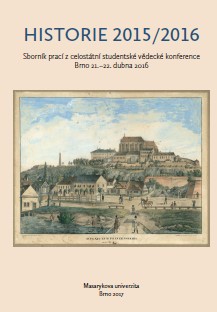VYSLANEC HOFMISTREM – HOFMISTR VYSLANCEM. JEDEN ROK O DVOJÍ ROLI HRABĚTE FRANTIŠKA KARLA VRATISLAVA Z MITROVIC U SASKO-POLSKÉHO DVORA V ROCE 1726
-
Author(s): Nela Michalicová
Subject(s): Diplomatic history, Political history, 18th Century
Published by: Masarykova univerzita nakladatelství
Keywords: Franz Karl Count Wratislaw von Mitrowitz; Diplomatic history; Imperial ambassador to Saxony-Poland; Hofmeister of Maria Joseph;
Summary/Abstract: Aristocrat career and public service in the early modern period is one of attractive areas of recent historical research. This also includes the field of aristocratic diplomatic service abroad, which previously stood on the edge of research interest. This paper depicts on the example of Franz Karl Count Wratislaw von Mitrowitz, how variable diplomatic service could be. In 1724, the Count was appointed the Imperial plenipotentiary minister at the Saxon-Polish Court, as well as the Oberhofmeister of Habsburg Archduchess Maria Josepha, who was married with Saxon-Polish Prince Friedrich Augustus. The second function was chosen intentionally by the Imperial administration to provide him permanent access to royal family in Poland in order to find out information which would be hard to gain for the Imperial ambassador. This study deals with the activities of Count Wratislaw in 1726 and its goal is to answer whether this combination of two functions in one person’shand was an appropriate tactic and whether Count Wratislaw could use both these offices successfully. The author found that Franz Karl Wratislaw left Dresden (home of Maria Josepha) in mid-1725 and travelled to Warsaw to ensure her suitable accommodation there, because she should accompany her husband there to stay at the court of his father and Polish king Augustus II. However, in the mid-December 1725, the prince Friedrich Augustus himself (without his wife) received the official invitation from the King. His wife Maria Josepha was forced to stay alone back in Saxony, reliant mainly on information from her Hofmeister, who, according to the new Emperor’s order, travelled with the Prince to Warsaw and could not stay with his Princess. Subsequent correspondence of Franz Karl, especially with Maria Josepha and Imperial Vice-Chancellor Friedrich Karl von Schönborn, shows that in 1726 he apparently preferred his diplomatic duties instead of the Hofmeister’s one. It was a clever resolution indeed because when Wratislaw returned from his diplomatic legacy to Russia (1728–1733), he was re-appointed to his former function of the Hofmeister of Maria Josepha (who had became the Polish Queen), and he also held the post of Imperial ambassador to Saxony-Poland again.
- Page Range: 115-134
- Page Count: 20
- Publication Year: 2017
- Language: Czech
- Content File-PDF

